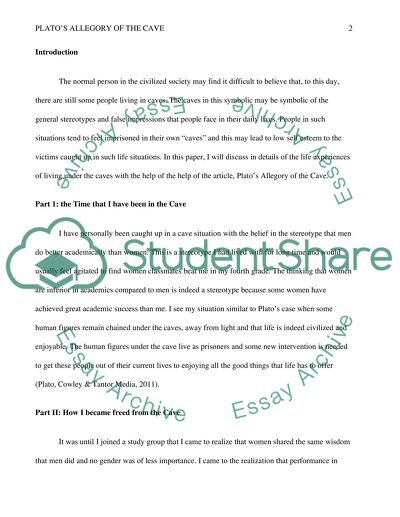

However, after she lost her memories and Henry took control of her simulations, he became the bearer of reality while her simulation became a mere shadow on the wall. That is probably where she found inspiration for creating alternative realities - or, rather, shadows of reality - through simulations. Henry recalls that Maura used to obsess over Plato's allegory when she was younger. Movies like the Christopher Nolan sci-fi film Interstellar, Martin Scorsese's Shutter Island, and even Wachowskis' The Matrix made references to the same allegory. Despite the limitations in their perception, the cave people accept the reality they are presented with because it is the only reality they know. The wall reflects shadows from the real world behind them but never gives them an accurate depiction of reality.

In his allegory, titled "The Cave," Plato describes a hypothetical scenario where a group of people is chained inside a cave, and all they can see is a blank wall in front of them. After her death, Henry started coping with his loss by meticulously studying the human mind, hoping to find answers for his wife's illness. Maura explains his downward spiral in a brief conversation with Eyk (Andreas Pietschmann) by recalling that her mother had Alzheimer’s, which gradually destroyed her ability to recognize family members. Working this to his advantage, Henry misused his daughter's technology by creating more simulations inside his primary simulation to study the dark depths of the human brain. However, it seems likely that many other forces got involved with the technology and escalated it into chaos. 1899 explained little of how the simulation grew from a child's playroom to a multi-layered system, or how Henry was part of it. In an attempt to " preserve" her son, she transferred his consciousness to a simulated reality where she and Daniel could spend time together. When Elliot's health started declining due to a mysterious disease, she could not deal with the pain and grief. Outside the simulation, Maura once lived with her husband Daniel (played by Aneurin Barnard from Peaky Blinders season 6's cast), and son Elliot (Fflyn Edwards). Everything from their memories to their physical appearance is a construct of the simulation. 1899 explained these mysterious events in its last few episodes by revealing that the ship is a simulation that has been manipulating the passengers' reality.

Little do they realize that another passenger from Prometheus named Daniel has boarded the ship.Ĭhaos ensues on the Kerberos when passengers start dropping dead, while Daniel attempts to force Maura (played by Emily Beecham from Cruella's cast) into questioning her sense of perception. After finding only a young boy, Elliot, on the ghost ship, Prometheus' crew takes him onboard and sets sail back home. 1899 takes a dark turn when Kerberos' crew receives a message from a nearby ship, which, upon discovery, turns out to be Prometheus. Early in 1899, it becomes evident that Kerberos is no ordinary ship and accommodates many technologies that are almost incomprehensible to the passengers. A ship named Kerberos is the primary setting for 1899's roster of diverse characters, while Prometheus is another ship that had reportedly gone missing before Kerberos set sail.


 0 kommentar(er)
0 kommentar(er)
